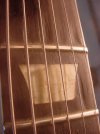trancegodz
Power User
I just got a Gibson 61 SG reissue.
The Rosewood fretboard has a noticeable scratchy sound when slowly bending strings that can be heard almost as loud as the note when recording. Is there any way to fix this or is this just the way rosewood fretboards are? Is this an issue only with certain types of rosewood fretboards?
Also when bending a string at any fret that has a pearl inlay fret marker there is a sticky feeling and a noticeable scratchy sound that can be heard almost as loud as the note when recording. My conclusion is that it is the type of pearloid material they are using.
This was not an issue at all on my old Les Paul Custom with an ebony fretboard or it's inlays. Not an issue on my Fender Stratocasters with maple fretboards either.
The Rosewood fretboard has a noticeable scratchy sound when slowly bending strings that can be heard almost as loud as the note when recording. Is there any way to fix this or is this just the way rosewood fretboards are? Is this an issue only with certain types of rosewood fretboards?
Also when bending a string at any fret that has a pearl inlay fret marker there is a sticky feeling and a noticeable scratchy sound that can be heard almost as loud as the note when recording. My conclusion is that it is the type of pearloid material they are using.
This was not an issue at all on my old Les Paul Custom with an ebony fretboard or it's inlays. Not an issue on my Fender Stratocasters with maple fretboards either.

